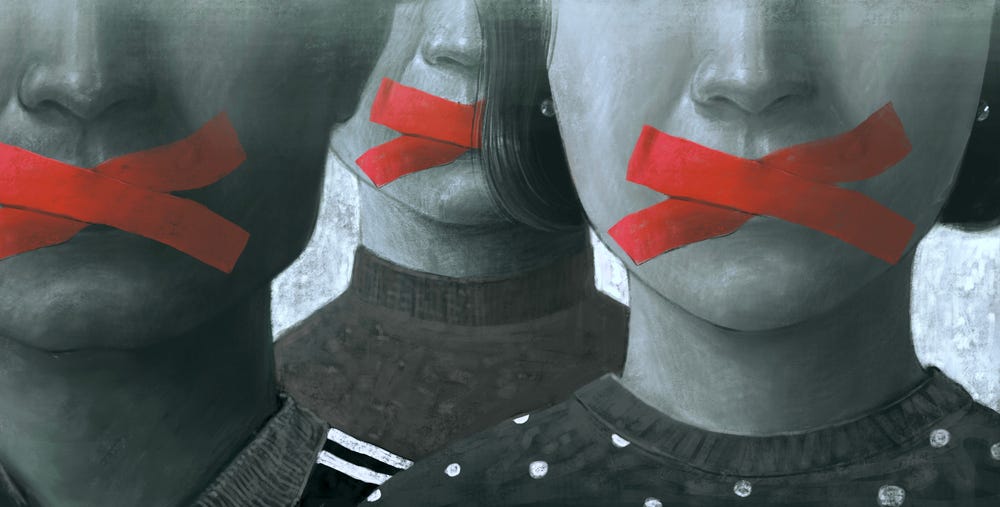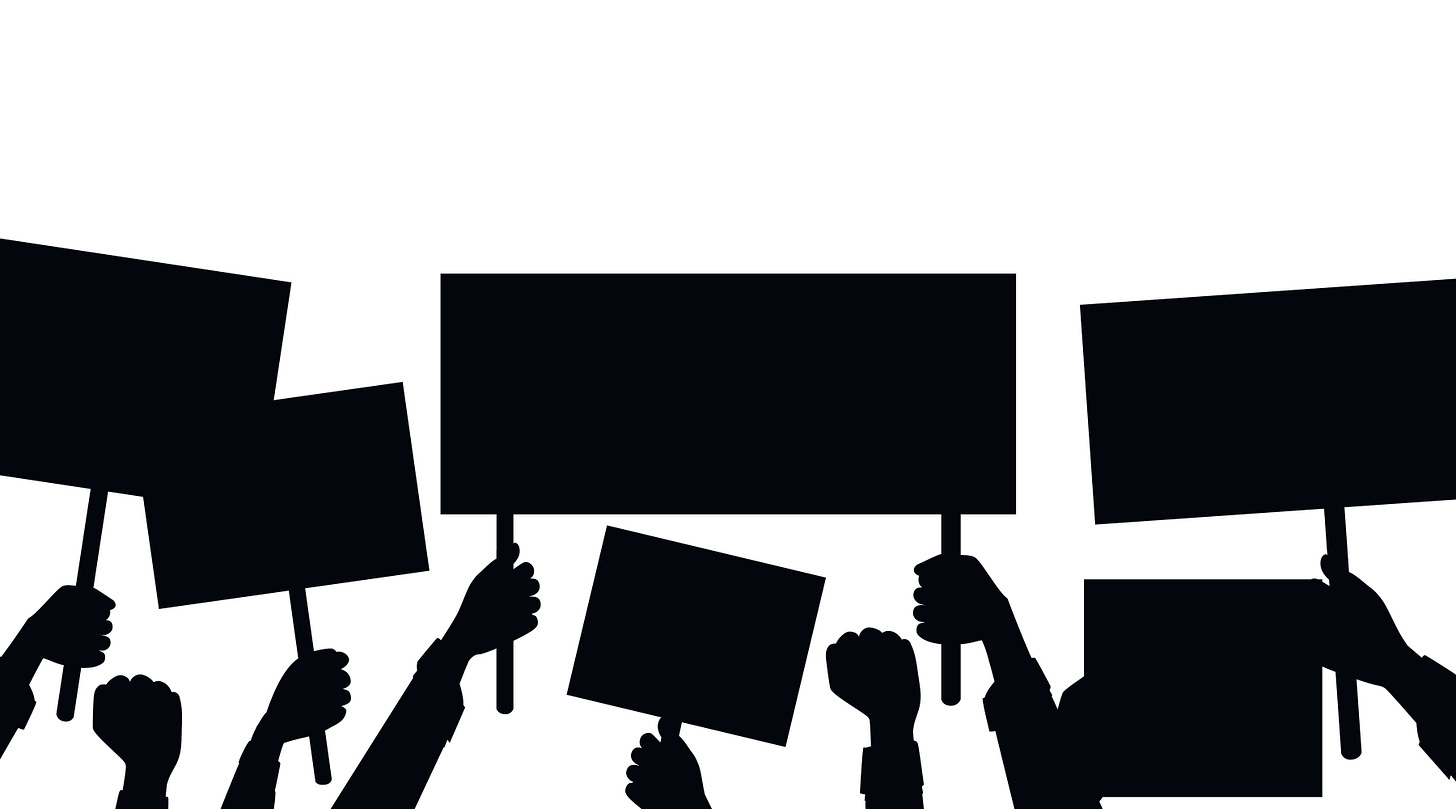E-Pluribus | February 22, 2022
Ivy League parents fear speaking out over trans athletes, liberal democracies are the front lines of the global war on free speech, and DEI concerns cause problems at progressive climate groups.
A round up of the latest and best writing and musings on the rise of illiberalism in the public discourse:
Suzy Weiss: Watching Lia Thomas Win
Lia Thomas, the transgender Ivy League swimmer at Penn, has been smashing records and winning event after event. She’s become the center of culture war debates over trans athletes, particularly over whether it is fair for a trans woman to compete in women’s sports given innate biological advantages. At Common Sense, Suzy Weiss explores the debate not happening - the parents who fear speaking out against what they believe to be Thomas’ unfair advantage over their daughters in competition.
But the Penn couple thinks that Thomas’s comfort has come at the expense of their own daughters’ who they say have received “veiled threats” from the university when it comes to speaking out. At the meet, the announcer opens with a warning against “racist, homophobic, or transphobic discrimination.”
So it is no surprise that not one of the swimmers would speak to me; nor have they spoken on the record to any other reporter. It’s not that they haven’t considered it. “One of the swimmers on their team called my daughter and asked if they were to put out a statement, if the Harvard swimmers would too,” a Harvard dad told me on Friday night.
[ . . . ]
These are Ivy League parents. They have opinions about everything. They will tell you that lanes four and five have the least turbulence. They will explain how there’s a $400 swimsuit that you can only wear once, but that might be worth it for the tenth of a second.
But as history unfolds in front of their noses, they refuse to comment.
One mom told me that she was happy that Lia gets to compete as her true self, before changing her mind and insisting that I delete my recording of our interview. After I spoke to one dad, his wife contacted me begging to take his name off the record. She thought that the consequences for speaking would be “severe” and texted: “Please don’t hurt my child!”
[ . . . ]
But now the rules—Thomas has followed all of the Ivy League and NCAA ones—have turned on them. “Whether you think it or not, you can’t go against her,” says the Brown dad. “No one wants to take the hard stance because they don’t want to be demonized.”
One of the Penn moms says her own daughter warned her against speaking out. “She’s worried about getting into grad school, and she doesnt want my name or hers to come up on Google attached to this.” (Her daughter is hoping to get a graduate degree in biology.)
The parents say their daughters know it’s wrong that Thomas is swimming against them but that they will not risk getting smeared with the label transphobe.
Read the full thing.
Jacob Mchangama: The War on Free Speech: Censorship’s Global Rise
When we conceptualize censorship and the decline of free speech on a global scale, we often immediately point to authoritarian regimes like China or North Korea. But Jacob Mchangama — founder and director of Justitia, a Copenhagen-based think tank that focuses on human rights — writes in an in-depth piece at Foreign Affairs that the true global threat to free speech comes from within liberal democracies. In other words, the very places that are supposed to be promoting these values to the world are slowly abandoning them.
But brutal repression in authoritarian states and creeping censorship in illiberal democracies only partly explain why free speech is in retreat. Liberal democracies, rather than constituting a counterweight to the authoritarian onslaught, are themselves contributing to the free-speech recession. In the wealthy, established democracies of Europe and North America, elites in political, academic, and media institutions that once cherished free expression as the lifeblood of democracy now worry that “free speech is killing us,” as the title of a 2019 New York Times op-ed by the writer Andrew Marantz put it. Many now point to unmediated disinformation and hateful speech on the Internet as evidence that free speech is being weaponized against democracy itself. Meanwhile, the growing strength and geopolitical clout of authoritarian and illiberal regimes have led to brutal limits on freedom of expression in many developing and middle-income countries that not long ago seemed poised to become freer, more open societies.
It is true that freedom of speech can be exploited to amplify division, sow distrust, and inflict serious harm. And the right to free expression is not absolute; laws properly prohibit threats and incitement to violence, for example. But the view that today’s fierce challenges to democratic institutions and values can be overcome by rolling back free speech is deeply misguided. Laws and norms protecting free speech still constitute “the great bulwark of liberty,” as the British essayist Thomas Gordon wrote in 1721. If not maintained, however, a bulwark can break, and without free speech, the future will be less free, democratic, and equal—and more ignorant, autocratic, and oppressive. Rather than abandon this most essential right, democracies should renew their commitment to free speech and use it to further liberal democratic ideals and counter authoritarian advances.
[ . . . ]
Ultimately, any society that becomes dependent on the centralized control of information and opinion will be neither free nor vibrant. Past attempts to rid the public sphere of ideas that authorities or elites considered extreme or harmful have tended to exclude the poor and the propertyless, foreigners, women, and religious, racial, ethnic, national, and sexual minorities. Until relatively recently in historical terms, those in power have deemed people in these categories too credulous, fickle, immoral, ignorant, or dangerous to have a voice in public affairs.
Liberal democracies must come to terms with the fact that in the Digital City, citizens and institutions cannot be shielded from hostile propaganda, hateful content, or disinformation without compromising their egalitarian and liberal values. Whatever fundamental reforms governments must pursue to ensure that humans can thrive, trust one another, and flourish in the Digital City, a robust commitment to free speech should be recognized as a necessary part of the solution rather than an outdated ideal to be discarded.
Read the full piece.
Zack Colman: The group that brought down Keystone XL faces agonies of its own
While we tend to focus on diversity, equity, and inclusion (DEI) initiatives at universities and corporations, it’s also creating internal conflicts at major progressive nonprofits and activist groups. At Politico, Zack Colman chronicles the troubles of 350.org, founded and backed by author and environmentalist Bill McKibben, with an emphasis on staff turmoil emerging from the group’s alleged lack of diversity.
The complex dynamic over race, diversity and equity that enveloped 350.org — and the quest to empower people of color to make consequential strategic decisions — reflected broader challenges in the environmental movement. White, wealthy liberals have dominated green groups for decades, coloring environmentalism with a reputation for elitism.
Five current and former staffers said 350.org was one of the few groups to attempt to rectify those long-standing tensions. It hired a justice and equity manager to the U.S. leadership team and created an internal equity team in 2018. That came as 350.org executed a three-year strategy that included hiring more managers and people of color.
Other process changes included implementing an equity hiring toolkit and a formal effort to tie programming back to issues confronting Black, Latino, Asian and Native American communities. It created a “Frontline Fund” to invest resources and programs in Black, Indigenous and other communities of color facing the starkest climate and pollution effects. In hiring, it implemented a requirement that half of all candidates for jobs be people of color before anyone can be made an offer.
[ . . . ]
But when 350.org ended up in a financial crisis that year — forcing a major downsizing and restructuring — those concerns about diversity once again bubbled to the surface. Some staffers contended that programs managed by people of color were starved of funding, setting them up for failure.
It was also hard to tell just how diverse the staff was. 350.org’s reporting on its racial and ethnic makeup has been opaque. The organization said it did not have systems in place for people to identify their race or other demographic information as recently as 2019, and is only just now getting a handle on that information. The organization did not report any racial demographic data on 83 percent of its senior staff and 80 percent of its full-time staff in 2021, according to Green 2.0, a nonprofit that tracks environmental group diversity and equity.
[ . . . ]
While the 2019 hiring spree had brought more workers of color to 350.org, some felt the resulting layoffs disproportionately affected those workers, too. A group of staff members wrote to 350.org’s global leadership team that implementation of November 2019 layoffs “have perpetuated many of the aspects of white supremacy culture that we are working so hard to combat.”
Read it all.
Around Twitter
Another First Amendment/discrimination case at SCOTUS:
Does America need to be a “Liberal Leviathan?”
Via the Foundation Against Intolerance & Racism (FAIR) and John McWhorter: What do labels really mean?









